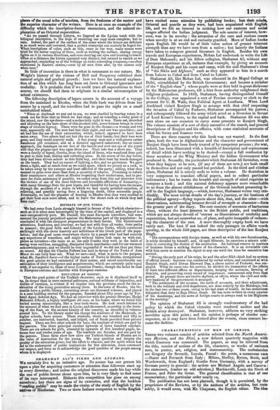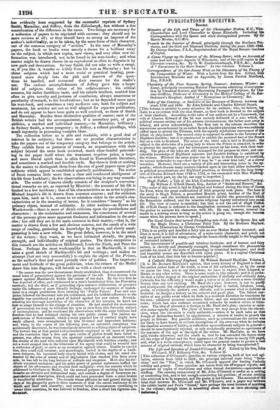CHARACTERISTICS OF MEN OF GENIUS.
THESE two volumes consist of articles selected from the North Ameri- can Review, and the Dial, a now defunct quarterly magazine with which Emerson was connected. The papers, as may be inferred from the title, consist of notices of the life, character, or works of eminenk men, in poetry, art, religion, and statesmanship. The ecclesiastics are Gregory the Seventh, Loyale, Pascal : the poets, a numerous race —Dante and Petrarch from Italy ; Milton, Shelley, Byron, Scott, and Wordsworth, from England ; Goethe from Germany, with a survey of German poetry in general : the artists are Michael Angelo and Canova : the statesmen, (rather an odd selection,) Machiavelli, Louis the Ninth of France, and Peter the Great. The general classification is that of our enumeration ; the particular order nearly to. The publication has not been planned, though it is permitted, by tha proprietors of the Reviews, or by the authors of the articles, but rests solely, it would seem, with Mr. Chapman, the English editor. The ides
has evidently been suggested by the successful reprints of Sydney Smith, Macaulay, and Jeffrey, from the Edinburgh, but without a due consideration of the difference in the cases. Two things are necessary for collection of papers to be reprinted with success : they should not be were reviews at all ; or they should have so strong an impress of the author's individuality, as to be taken, by the mere force of their character, out of the common category of "articles." In the case of Macaulay's papers, the book or books were merely a theme for a brilliant essay on the subject, in which new topics, new views, and very often new in- formation was introduced, not to be found in his text-books ; and what matter might be drawn thence he so reproduced as often to disguise it by new garb and decorations. Sydney Smith did not take so wide a range, or, if you like it, wander so widely from his text as Macaulay ; but he those subjects which had a more social or practical bearing, pene- trated more deeply into the pith and marrow of the ques- tions he handled, and extracted their essence for the reader's use. The various accomplishments of Jeffrey gave him a larger field of subjects than either of his collaborateurs : his critical acumen, his rather fastidious taste, and his subtile intellect, enabled him often to give novelty and justness of conclusion, always smartness or peculiarity of remark, to his lucubrations ; but as he depended more upon his text-book, and sometimes a very mediocre one, both for subject and treatment, his articles are not so well adapted for separate publication, and do not appear to have been quite so well received, as those of Smith and Macaulay. Besides these distinctive qualities of matter, each of the British writers had the accompaniment, if a secondary part, of great abilities, a marked and individual manner,—in Macaulay, brilliancy ; in Sydney Smith, a terse pungency ; in Jeffrey, a refined persiflage, with snitch ingenuity in presenting complex ideas.
The collection before us is able and readable, with a good deal of interest in its subjects; but there are no peculiar characteristics to take the papers out of the temporary category that belongs to the article. They exhibit force or justness of remark, an acquaintance with their subject beyond the mere book reviewed, much clear-headed painstak- ing in the paper itself where the treatment requires pains, a larger and more liberal spirit than is often found in Transatlantic literature, and sometimes a marked and forcible style. But there is little or nothing in the matter to distinguish them from the run of good papers upon given subjects which appear in established quarterly publications. The notice of Scott contains little more than a clear and condensed abridgment of his life from Lockhart; the few observations not being in any way remark- able. The notice of Canova chiefly consists of the sculptor's conversa- tional remarks on art., as reported by Missirini : the account of his life is limited to a few incidents ; that of his characteristics as an artist is jejune. Michael Angelo's life is drawn from common sources ; and the criticism upon him, such as it is, seems to us mistaken either in the artist's cha- racteristics or in the meaning of terms, for it considers " beauty " as his primary object, instead of sublimity. In other notices—as Byron and Wordsworth—there is more of direct criticism upon the productions and .characters : in the ecclesiastics and statesmen, the remoteness of several of the persons gives more apparent freshness and information to the arti- cles; but still they are in the main common in their matter,—that is, the matter is drawn from a few and obvious sources, not the result of a wide range of reading, gathering its knowledge by degrees, and slowly amal- gamating it into a new whole. The great defect, however, is in the mind of the writers : they want, as we have intimated already, the grasp, strength, and individuality of original genius. The three exceptions to this remark are the articles on Hildebrand, Louis the Ninth, and Peter the Great. Perhaps the most workmanlike is that on Machiavelli, it con- tains a good sketch of Machiavelli's life and writings ; and makes an attempt (but not very successfully) to explain the object of the Prince, as the author's first and more juvenile view of politics. The imprison- ment and fortitude of the great politician, when the return of the Medici threw him into disgrace, will furnish us with a short extract.
"No sooner was the new Government firmly established, than it commenced the usual train of persecutions against the partisans of the old. Three decrees were passed against Machiavelli within the course of ten days. By the two first he was deprived of office, and condemned to a year's banishment from the Florentine territory; but the third, as if proceeding upon maturer deliberation, or procured tinder the influence of more friendly feelings, exchanged the sentence ot banish- ment to a simple prohibition from entering the Public Palace.' Fear and sus- picion followed the Secretary into his retirement, and his faithful adherence to the republic was considered as a proof of hatred against her new rulers. Notwith- standing his thorough knowledge of the character of his enemies, he knew not 11.0W to adapt himself to his change of situation. He had studied the movements of government too long to withdraw his eyes at once from this favourite subject of contemplation; and he coutinued his observations with the same boldness and freedom that he had indulged during his own public career. The jealous ap- -prehensions of Governmeut which a more guarded line of conduct might have easily allayed, were strengthened by this ill-timed and imprudent boldness; and when, in the coarse of the following year, an extensive conspiracy was accidentally discovered, he was immediately arrested as a fitting object of suspicion. The torture was at that period indiscriminately employed in all cases of arrest; and the conviction that a free and open course of justice would have failed to procure, was often wrung from the agonized confessions of an innocent victim. Six shocks of the cord were inflicted upon Machiavelli with fruitless cruelty; and not a word escaped him in the bitterness of his agony that could be wrested into a confession of guilt, or serve as an accusation against others. Unable to convict him, they could still torment; and accordingly, buried in the depths of a loath- some dungeon, his lacerated body closely bound with chains, and his mind dis- tracted by the cries of misery and of degradation that reached him from every aide, he was left to the long torture of solitude and suspense. Here also his for- titude remained unshaken; and his noble power of patient endurance baffled the snares of his adversaries and wearied their malignity: even the sonnets which he addressed to Giuliano de Medici, for the avowed purpose of exciting his interest, breathe an elevated and independent tone, and contain a degree of humorous ex- postulation and description, which could not have proceeded from a mind broken or humbled by misfortune. The friends whose affection he had gained during the days of his prosperity gave in these moments of trial the surest testimony to his Worth and their own sincerity; and several lucky circumstances combining to avour their exertions, he was restored to freedom, after a short but rigorous con- gamest



























 Previous page
Previous page